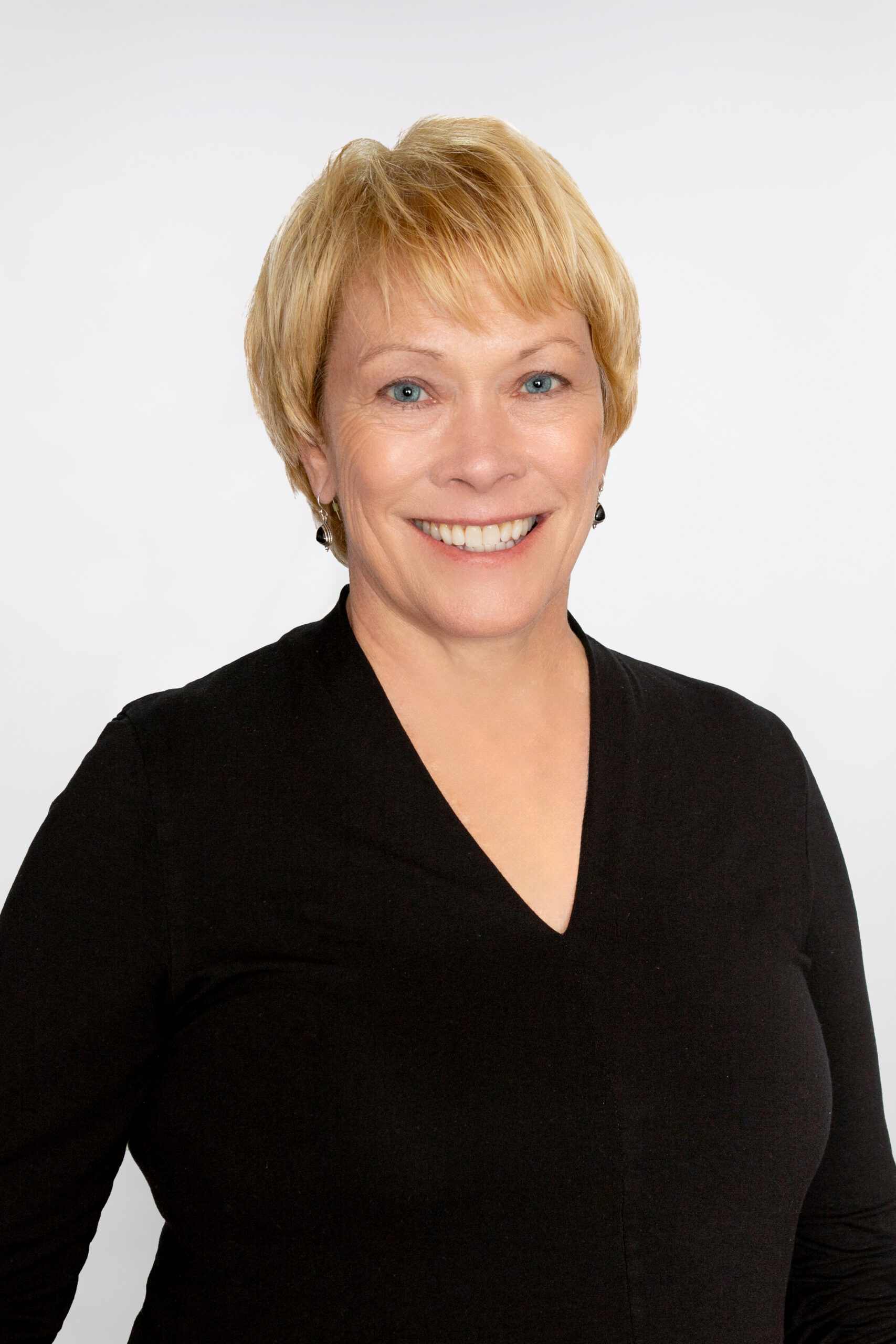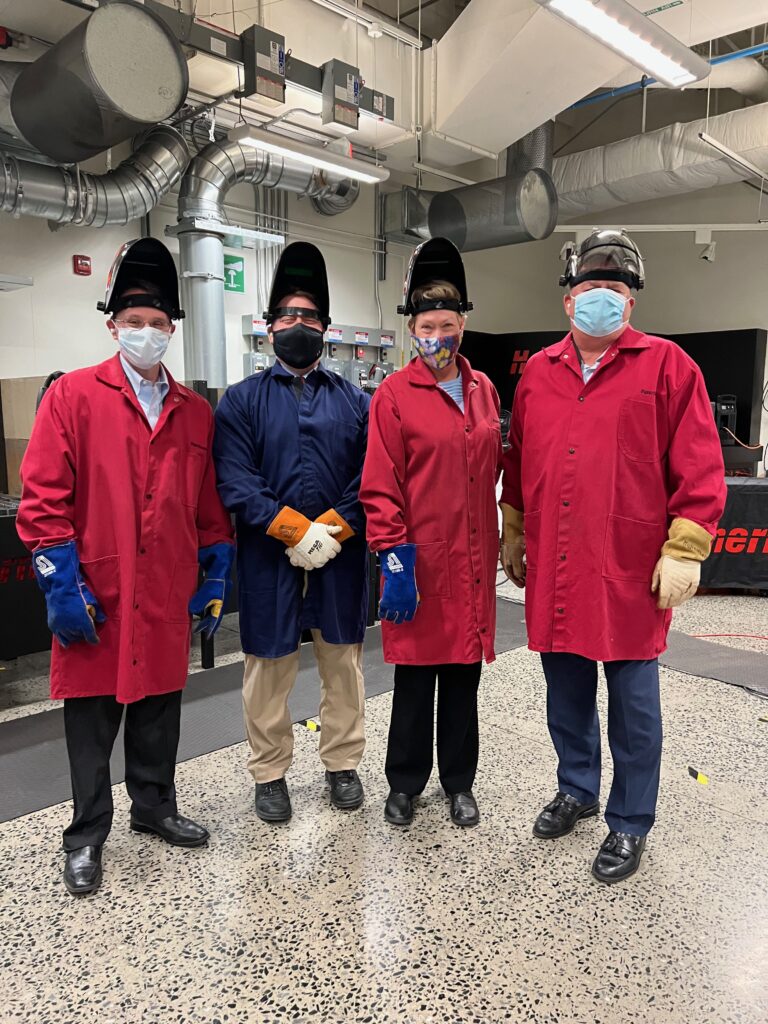
Micaela Niven Bulich
Former VP Global Supply Chain—GE Renewable Energy Onshore Wind / Operating Advisor—Clayton, Dubilier & Rice
Micaela Niven Bulich grew up believing in wings. The second of six girls, she was one in a tribe of women. “It was an amazing childhood,” she says. Her father, David, trained as an electrician and eventually became CEO of a small company. Her mother, Nancy, left nursing school after marrying Micaela’s father and starting their family; she completed her LPN when Micaela was a teen. “Six kids at home and she went back to school,” Micaela marvels. “They always gave us the sense that we could be anything we wanted to be—that there were no limits.”
Micaela and her sisters were encouraged to explore “everything,” she says. She would often join her dad in the garage working on projects. For Micaela, that might mean building a go-kart with him, but she was also fascinated by electricity and understanding how things worked. At a very young age she started earning her own money, first by selling seed packets door-to-door in the neighborhood; at age nine she had a paper route with her older sister. She was also heavily influenced by her Girl Scout leaders who led a troop focused on outdoor adventures hiking, camping, and cycling around New England.
And then Micaela discovered flight—rotary-winged flight. Growing up near the headquarters of Sikorsky Aircraft—birthplace of helicopter manufacturing, including famous choppers like Marine One—Micaela often saw helicopters winging by on test flights. She made up her mind that she was going to become a rotary wing pilot, too. In fourth grade, she even wrote to Sikorsky to tell them she was a fan. “Some charming person wrote back and sent me a packet with the history of Igor Sikorsky and pictures of their helicopters,” she says. From then on, her bedroom walls were pinned with photos of rotary-wing aircraft.

There was just one problem: Micaela got extremely motion sick. Something to deal with later; in the meantime, she became a gifted athlete who won a volleyball scholarship to college. She also discovered she was good at math and science. Building on her childhood fascination with electronics, she decided she would study electrical engineering in college.
Not so fast, said her high school guidance counselor. First, she told Micaela, women don’t usually become engineers, so there’s that. Then, she said, “We don’t think your grades are good enough” to become an engineer. What she didn’t know was that Micaela had already been accepted early decision at Syracuse University into their engineering program. “What if I had talked to her first?” she wonders now. “I might not have had the confidence even to apply.” She ultimately decided to study engineering at University of Hartford because they offered her the best scholarship package.
Four years later, while finishing her senior year, Micaela was recruited by Sikorsky Aircraft. She still longed to be a pilot but decided to settle for the next best thing: She became a flight controls engineer.
“I remember going to my first day at Sikorsky,” she says. Of the 1,200 engineers at the time, only two were women—Micaela and Vicki, “an intelligent short blonde who was tough as nails,” she recalls. When Micaela joined the flight controls group, a member of the team remarked, “But we already have one.” Micaela remembers wondering, One what? “We already have one woman on the team,” someone told her. “Oh,” she replied. “Well, now you have two.”
In fact, though, being one of the few women at Sikorsky ended up working to her advantage. “I was a novelty,” she says, “and I loved rotary wing flight and shared my excitement with everyone!” The pilots invited her to fly in every model of helicopter Sikorsky was working on, which she could do if she nibbled crackers constantly during the flight to control motion sickness. Her work ethic also got Micaela invited to the Future Leaders group. There, she met a cluster of senior employees who would become important mentors.
While at University of Hartford, another electrical engineer also caught her attention. This one—Jimmy Bulich—became her husband. In 1988, as she finished her master’s degree in electrical engineering at Rensselaer Polytechnic Institute, Micaela left Sikorsky and followed Jimmy to North Carolina and to her new job with DuPont.
At DuPont, Micaela worked her way up from a start writing software code into plant management. She joined a group of engineers tasked with defining best practices at regional fiber production plants. She once again found mentors willing to invest in her success and prepare her for a rapid rise through the leadership ranks at DuPont.
Micaela used to keep a quote based on writings from science fiction writer Ray Bradbury on her desk. “Sometimes,” it read, “you just have to leap and grow wings on the way down.” As Micaela’s career took off, she and Jimmy started their family. When their second son was born, they faced a decision. Daycare options in rural Virginia were limited, so Jimmy chose to begin a new career as a stay-at-home dad.
Then, following Micaela’s career promotion to Texas, they paused again. They realized their two sons were growing up far from all their relatives. Jimmy and Micaela also faced a future—if they followed Micaela’s career trajectory—that would mean relocating with every promotion. “We decided life was short,” she says, “and we wanted our kids to be from somewhere. That meant we should live where we really wanted to live and figure out the rest when we got there.” Home looked like the Hudson River Valley of upstate New York where Jimmy had grown up. They made their leap and bought an old dairy farm. They also re-thought their roles. Micaela was fortunate to have a former boss from DuPont hire her to work remotely, from home (“Unheard of”) and Jimmy expanded his career as stay-at-home dad (“By far, the tougher job”) to also become an organic farmer.
They’d jumped and grew strong wings on the way down.
A year into their new life, Micaela joined GE—the start of 20 years with the corporation. Over two decades, she took on many roles: Chemical Operations Manager (GE Plastics); President (GE Petrochemicals); Senior Executive, Global Supply Chain (GE Plastics); Senior Executive, Quality and Regulatory Compliance (GE Energy); and VP Sourcing (GE Energy). In her final role, she was VP-Global Supply Chain for GE Renewable Energy’s Onshore Wind business. She managed her entire GE career from their home in the Hudson Valley. She’s thankful for the leadership that believed in her and enabled her to manage her location constraints while continuing to advance her career to the highest levels at GE.
In those various positions, her responsibilities encompassed supply chain strategy, sourcing and global procurement, planning, manufacturing, logistics, and environmental health and safety. For her efforts, GE recognized her with their GE Chairman’s Hero of Growth Award in 2006, made her a GE company officer in 2011, awarded her the GE Bold Award in 2012, and then the GE Supply Chain Excellence Award in 2016. Micaela is also a Lean Six Sigma Master Black Belt. In 2018, her alma mater (University of Hartford College of Engineering, Technology, and Architecture) named her Alumni of the Year.
What she realized as she served, though, was how challenging—and lonely—the path could be for women. “Women can be so hard on themselves,” Micaela says. “One thing we began to see was how many women in STEM we were losing in the middle of their careers. I don’t think it was because they wanted to leave STEM, necessarily. I think it was more that they couldn’t see how to successfully balance everything.”
So, Micaela made a point throughout her career of being an advocate for women in STEM and supply chain. She joined the existing Women’s Network when she began work at GE and went on to co-found GE’s Women in Supply Chain network. She also joined the advisory board of AWESOME (Achieving Women’s Excellence in Supply Chain Operations, Management and Education) to advance senior women in supply chain leadership, where she still serves.
“I wanted women to understand that there are different roles you can have at different times in your life,” she says. “I remember seeing Andrea Jung—the CEO of Avon and a member of GE’s board—speak one time. And she told us, ‘Women can have it all; you just can’t have it all every day.’ I loved that. In my own life, some days GE won and some days my family won. I just tried to make the right decision about who was the priority that day. I may be passionate about my job, but I’m also a daughter and a mother and a wife and a friend.”
Today, Micaela’s family is grown. One son followed his mother’s footsteps into supply chain management; the other is a design engineer for helicopters. Micaela and Jimmy no longer farm, but they still live on the farm property in the Hudson River valley and are focused on open space preservation. Micaela is busy as well serving on the board of directors of Hypertherm, Inc., an industrial cutting solutions and software company based in New Hampshire. She’s also a Supply Chain and Procurement Operating Advisor for Clayton, Dubilier & Rice, one of the oldest private equity investment firms in the world. She is the first female advisor in their history, and presently the only female advisor.
“Just about everywhere I went in my career, it was mostly all guys,” she admits. “But I always made a point of finding other women in leadership so we could navigate things together. What I want women to know is that they shouldn’t feel like they should have it all figured out. Just stick with what’s important to you; then be open and flexible to new opportunities along the way.”
Micaela will never forget getting called into work at Sikorsky at 2 a.m. early in her career. “We had a quality issue on a helicopter with a delivery date coming up and millions of dollars at stake,” she says. “So, I got called in to support the production line. And this older gentleman came up to me and said, ‘What’s a nice woman like you doing here? Why don’t you find yourself a husband, so you don’t have to do this?’”
She laughs. “He wasn’t trying to be rude. But I told him, “Hey, I want to do this. I went to school a long time so I could do this. I’m not looking to be rescued. I know you think having a husband would save me. But this? This is what I want to do.”